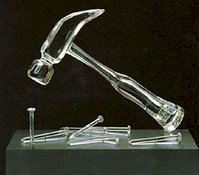 David Seaton's News Links
David Seaton's News LinksI love the way this article primly refers to anti-war and civil liberty activists, who have led the charge in this election, as "interest groups". I usually think of oil, NRA and AIPAC as "interest groups". The Republicans aren't so shy about serving their base and their "interest groups," are they? Maybe they actually believe some of the tripe they advocate. If the Democrats play the "center" they are going to last about as long as a glacier in globalization. What they have to do, if they aren't going to be as useless as the glass hammer in the picture, is move the center to the left. Do they really think that volunteers are going to work themselves into a frazzle just so that Hillary Clinton can execute Murdoch's agenda. That is a surefire recipe for failure. DS
Abstract: After toppling the long-dominant Republicans in a hard-fought election, the Democratic Party's incoming congressional leaders have immediately found themselves in another difficult struggle — with their own supporters. Some of the very activists who helped propel the Democrats to a majority in the House and Senate last week are claiming credit for the victories and demanding what they consider their due: a set of ambitious — and politically provocative — actions on gun control, abortion, national security and other issues that party leaders fear could alienate moderate voters and leave Democrats vulnerable to GOP attacks as big spenders or soft on terrorism. The conflict underscores the challenge facing the Democrats in line to lead Congress — Nancy Pelosi of San Francisco in the House and Harry Reid of Nevada in the Senate. Each has pledged in recent days to "govern from the center," after a campaign in which anger over the Iraq war and GOP scandals helped their party attract some unusually conservative candidates and a large share of independent voters. Turning off those new voters could undermine Democrats' hopes of solidifying their new majorities and taking the White House in 2008. But to the leaders of interest groups who are core supporters of the Democratic Party, and who had been barred under Republican rule from the inner sanctums of power, the new Congress means a time for action, not compromise. Lobbyists for the American Civil Liberties Union, for example, are all but counting on Democrats to repeal the most controversial provisions of the Patriot Act, the anti-terrorist law pushed by the White House that some critics call unconstitutional. They also want to end President Bush's domestic wiretapping program. "We are not going to let them off the hook," said Caroline Fredrickson, the ACLU's legislative director, of the newly empowered Democratic leaders in Congress. "We will hold their feet to the fire and use all the tools we can to mobilize our members." Similar vows are coming from lobbyists for abortion rights, who want to expand family-planning options for poor women and scale back Bush's focus on abstinence education, and from gun-control advocates, who hope to revive a lapsed ban on assault weapons. Labor unions, a core Democratic constituency, are demanding universal healthcare and laws discouraging corporations from seeking inexpensive labor overseas.(...) Eli Pariser, executive director of the political action committee associated with the liberal activist group MoveOn.org, warned that Democratic leaders would be ill-advised to ignore the party's base. "A huge number of people were involved in putting them over the top," Pariser said. "There's a huge group of people engaged and energized and ready to support Pelosi and company when they boldly lead — and to hold them to account if they stray." Pressure on Democrats is especially acute to redirect U.S. policy in Iraq. Many Democrats say the issue was the most important one driving the party's victory. Democratic lawmakers have not unified behind a single Iraq policy. READ ALL
No comments:
Post a Comment